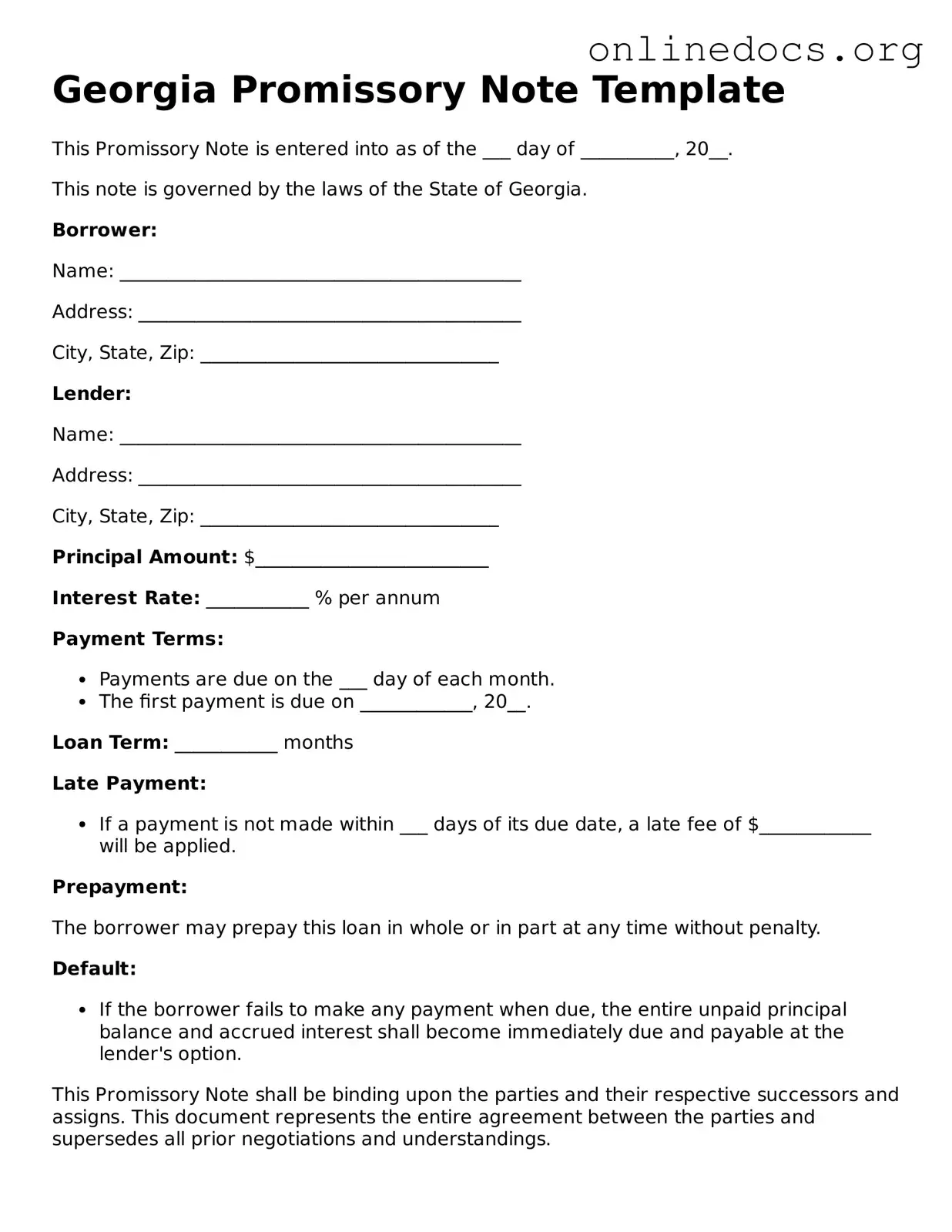The Georgia Promissory Note form shares similarities with a Loan Agreement. Both documents outline the terms under which a borrower agrees to repay a loan. A Loan Agreement typically includes details such as the loan amount, interest rate, repayment schedule, and consequences for default. While a Promissory Note is a more straightforward document focused on the borrower's promise to repay, a Loan Agreement often contains additional provisions that govern the relationship between the borrower and lender, making it more comprehensive.
Another document that resembles the Georgia Promissory Note is the Mortgage. A Mortgage secures a loan with real property, providing the lender with a legal claim to the property if the borrower defaults. Like a Promissory Note, a Mortgage outlines the borrower's obligation to repay the loan. However, a Mortgage includes specific details about the property being used as collateral, whereas a Promissory Note focuses solely on the borrower's promise to pay back the loan amount.
The Georgia Promissory Note is also similar to a Secured Promissory Note. Both documents serve as written promises to repay a loan. However, a Secured Promissory Note includes collateral to back the loan, offering the lender additional security. In contrast, a standard Promissory Note may not have collateral, relying solely on the borrower's creditworthiness. This distinction can significantly impact the risk and terms associated with the loan.
A Personal Guarantee can be compared to the Georgia Promissory Note as well. In both cases, one party promises to pay a debt. A Personal Guarantee is often used in business loans, where an individual agrees to be personally responsible for the debt of a business. While a Promissory Note is typically associated with individual borrowers, both documents aim to provide assurance to the lender regarding repayment.
The Georgia Promissory Note form is akin to an IOU. An IOU is a simple acknowledgment of a debt, stating that one party owes money to another. While an IOU lacks the formal structure and detailed terms of a Promissory Note, both documents serve to recognize a debt and the obligation to repay it. However, an IOU may not include interest rates or repayment schedules, making it less formal than a Promissory Note.
A Lease Agreement also bears similarities to the Georgia Promissory Note. In a Lease Agreement, a tenant agrees to pay rent to a landlord, which is a form of borrowing the use of property. Both documents establish a payment obligation, although a Lease Agreement typically includes terms about the duration of the lease and property use, while a Promissory Note focuses solely on the repayment of borrowed funds.
The Georgia Promissory Note can be compared to a Credit Card Agreement. Both documents outline the terms of borrowing money, including interest rates and repayment expectations. A Credit Card Agreement specifies the credit limit and terms of use, while a Promissory Note is more focused on a specific loan amount and repayment schedule. Both serve to protect the lender's interests while providing the borrower with access to funds.
Another document that resembles the Georgia Promissory Note is a Debt Settlement Agreement. In situations where a borrower cannot repay a loan, a Debt Settlement Agreement outlines the terms under which the borrower and lender agree to settle the debt for less than the full amount owed. While a Promissory Note establishes the original loan terms, a Debt Settlement Agreement modifies those terms based on the borrower's financial circumstances.
In the realm of financial agreements, confidentiality remains paramount, especially when dealing with sensitive information related to loans and modifications. For parties involved in such transactions, a Non-disclosure Agreement is essential to ensure that proprietary details are protected. To learn more about this important document and how it can safeguard your interests, consider visiting https://californiapdfforms.com/non-disclosure-agreement-form/.
Lastly, a Business Loan Agreement is similar to the Georgia Promissory Note in that it involves a promise to repay borrowed funds. This document is specifically tailored for business loans and includes terms that address the unique aspects of business financing. While a Promissory Note can be used for personal loans, a Business Loan Agreement often includes clauses about business operations, financial reporting, and other factors relevant to business borrowers.
